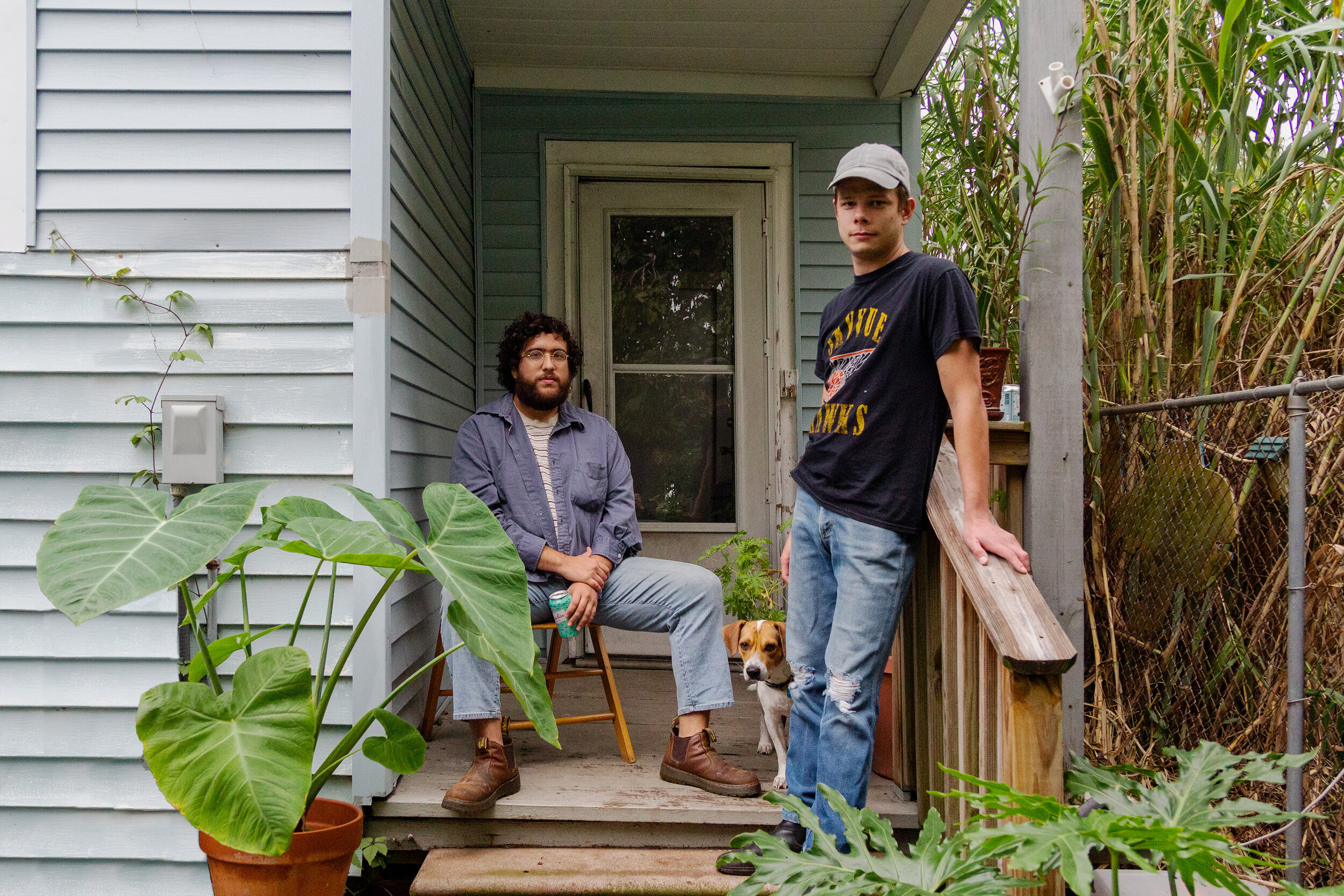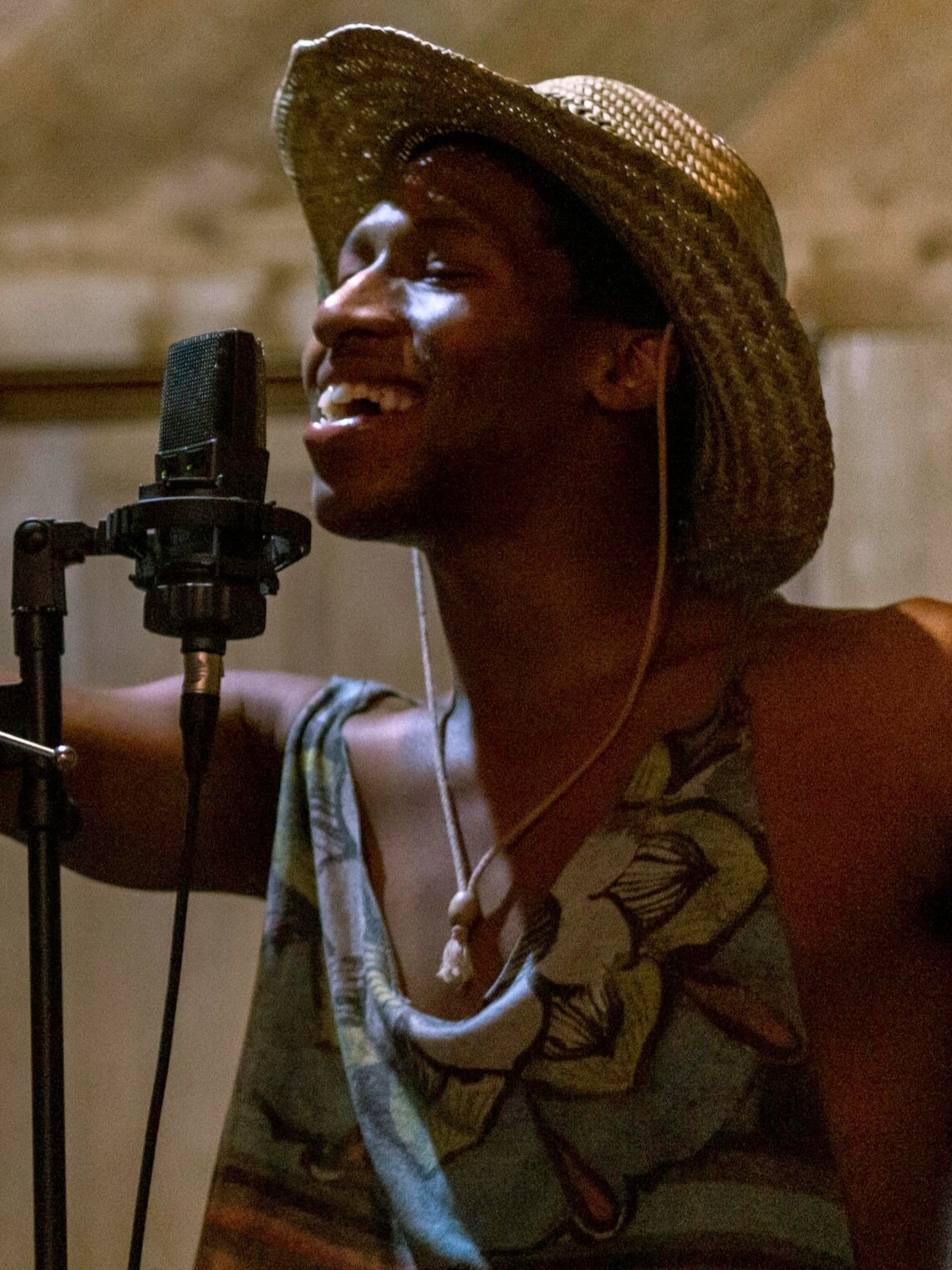COVID-19 Forces Lawn to Find New Ways to Promote New Album

Lawn on the back porch, by Victoria Conway
The New Orleans-based indie rock band has to figure out how to get its new album, “Johnny,” out of the house.
New Orleans’ Lawn fits the prototype for the indie band. The talented duo is low-key in all the right ways, challenging the trite extravaganza of the music industry in the ways they present themselves. Talk to them and it quickly becomes apparent that the air of normalcy they exude is genuine. Their transparent, down-to-earth attitude distinguishes them from other musicians through the perception that they are just like anyone else. Simply put, their presence as a band reflects the DIY blueprint.
Mac Folger and Rui De Magalhães of Lawn met in the local house show scene, which is surprisingly meager for a city as musical as New Orleans. Hailing from Nashville, Folger began hosting house shows in his Uptown home, not realizing the role he played in creating a unique space for the local scene. It was in this sphere that he met De Magalhães, and the duo began playing music together shortly thereafter.
They started to play together for fun, not thinking much of it. Eventually, they wrote a couple of songs with drummer Nick Corson, currently a member of Video Age, and recorded an EP with the intent to distribute it for booking. Exploding in Sound founder Dan Goldin picked up the EP and wrote about it at Post-Trash, and within days, people were posting about the record. Having recorded the EP with the expectation of a limited audience, if any at all, the Internet traffic was a surprise to the band. Folger says, “I was like, Oh shit, I forgot the Internet can do that.”
Johnny, the band’s sophomore album, was released on September 4 on Community Records and Muscle Beach Records. Recorded by Matthew Seferian of Matt Surfin’ & Friends, the album’s production tells the tale of the tight-knit New Orleans indie community, and really, the dynamic of the indie scene as a whole. Featuring Folger on guitar, keys, and vocals, De Magalhães on bass, guitar, and vocals, and Hunter Keene on drums, the Pollock-like sense of collaboration emphasizes the importance of community in the DIY scene. Locally, Community Records has played a significant role in the construction of the indie community in New Orleans, taking on bands across a wide variety of genres that fall under the broad umbrella of punk. In contrast to the superficial showmanship of many mainstream genres, the indie scene places a refreshing emphasis on authenticity. There’s no room for pretending when your presence as an artist is the same as behind closed doors, and it’s this transparency that allows for a unique sense of belonging for indie artists and fans alike.
The influences of Talking Heads, The Strokes, The Kinks, and a variety of other artists contribute to a heterogeneous record. De Magalhães says, “My top influences are people who can’t really sing”—a preference evident in the prominent talk-singing that carries numerous tracks. The musical influences that permeate through the album provide a reminder of the foundations of punk and the birth of the DIY scene, an ode to the forefathers (and foremothers) who paved the way for those who came after them. It is through this powerful history that Lawn’s existence, and that of most other indie bands, were given a platform to be what they are: a creative outlet for musicians who make music for the sake of it.
Though the group evaded COVID complications during Johnny’s recording process, which occurred over a few months in 2019, the loss of live music—and the closure of bars, coffee shops, and music venues—has obstructed the band’s usual means of promoting the new record. In this age of video calls and livestreams, the generally off-the-grid duo has been forced to focus on their social media presence to promote their newest release and attract new listeners. This emphasis on content creation is relatively new for the band, whose decentralization of social media is evident in their somewhat ironic Instagram username, @lawn_online. According to Folger, the pair is used to being “not so serious on the Internet.” The use of social media platforms as a promotional tool requires more than just the time it takes to hit “Post”; it requires them to construct online personas, which can be difficult to integrate into their anti-show biz aesthetic. However, in classic indie fashion, the duo has seemingly remained true to themselves with unconventional, often absurdist content. Folger’s personal philosophy, reflected in the band’s posts, is that “sometimes it’s more grabbing to have the right kind of bullshit on the screen.”
The pandemic has affected everyone in different ways, but most notably, there seems to be a shared impetus to reevaluate what we’re doing and how we do it. Luckily for the pair behind Lawn, their music and the drive to create it is a product of honest passion. Both their discography and their online presence are representative of them as individuals, fostering a sense of closeness between them and their “fans,” a term they’re inclined to shy from. This insistence on sincerity is a central pillar of Lawn and the indie community, and it leads to a revolutionary dismissal of the superficiality that has long dominated the entertainment industry. While indie bands across the country work to formulate their brand, Lawn has managed to perfect their unassuming presence as the guys next door.






